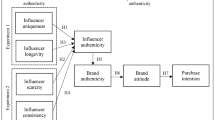Abstract
Brand communication practices relying on ordinary consumers—that is, peer endorsers—is getting increasingly popular (Kapitan and Silvera 2016). Advertising campaigns for new products resulting from consumer empowerment strategies (CES) often include the CES winner’s endorsement. For instance, the winning consumer-creator of new Oreo “Cherry Cola” was pictured in the product launch campaign, including additional descriptions and stories about her. Little is known about the effectiveness factors of peer endorsement though and more research is needed. Attractiveness is acknowledged to be influential in a celebrity endorsement context (e.g., Knoll and Matthes 2017). Instead, in a CES context, it might be reasonable to think that consumers expect to see peer endorsers looking “like themselves,” by virtue of their social user identity (Dahl et al. 2014). This research examines whether attractiveness also prevails in a peer endorsement context, that is, CES-related advertisements.
First, relying on Strauss and Corbin’s procedures (1998), this research analyzes 29 informants’ (20–68 years old; various backgrounds) reactions towards peer endorsers in a CES context. Interviews, based on semi-directive guides, were either individual (32–120 min) or in groups (5, 6 and 9 informants, 120 min). It emerges that informants spontaneously perceive the winner’s presence in advertising as a CES credibility enhancer, that is, it makes CES more real and consumers’ voices more effectively listened. But doubts about the winner’s authenticity simultaneously arise for three reasons: perceptions of too much attractiveness, too much congruence with the ideal brand audience and difficulties to understand the motives justifying the winner’s participation in CES. Drawing on the schema theory (Mandler 1982), we assume that the incongruities between the endorser and the mental representation the informants store about a “consumer-like-themselves” generate too high cognitive efforts, hence doubts about endorser’s authenticity.
Two between-subjects experiments confirm that endorser’s attractiveness and congruence prime skepticism toward the CES process. Besides, we find that skepticism attenuates when cueing brand process transparency. This is because audiences may attribute public-serving motives, that is, the brand listening of participants’ voices in their greater diversity. Then, describing a winner as highly creative provides audiences with valid, disposition-based motives, in line with the attribution theory (Kelley 1973) and also helps to decrease skepticism. The perceived manipulative intent is discounted to innovativeness for the greatest number’s sake. Finally, the negative skepticism effect we describe is found to mediate purchase intentions.
This research contributes to the endorsement literature by showing that attractiveness and congruence are no effectiveness factors in a peer endorsement context. It also answers innovation scholars’ call for research (Nishikawa et al. 2017) by showing the effects of giving additional details about the CES-winner. Alerting marketers about potential negative effects of peer endorsement and identifying remedies to attenuate them are also of high practical relevance.
Access this chapter
Tax calculation will be finalised at checkout
Purchases are for personal use only
Similar content being viewed by others
Author information
Authors and Affiliations
Corresponding author
Editor information
Editors and Affiliations
Rights and permissions
Copyright information
© 2020 The Academy of Marketing Science
About this paper
Cite this paper
Cambier, F., Poncin, I. (2020). Co-creators Endorsing their Winning Product Idea in Ads: Dealing with Brand Audiences’ Skepticism: An Abstract. In: Wu, S., Pantoja, F., Krey, N. (eds) Marketing Opportunities and Challenges in a Changing Global Marketplace. AMSAC 2019. Developments in Marketing Science: Proceedings of the Academy of Marketing Science. Springer, Cham. https://doi.org/10.1007/978-3-030-39165-2_51
Download citation
DOI: https://doi.org/10.1007/978-3-030-39165-2_51
Published:
Publisher Name: Springer, Cham
Print ISBN: 978-3-030-39164-5
Online ISBN: 978-3-030-39165-2
eBook Packages: Business and ManagementBusiness and Management (R0)




